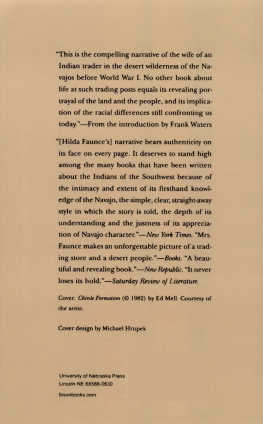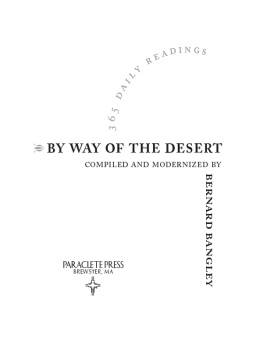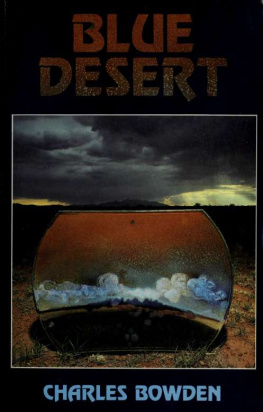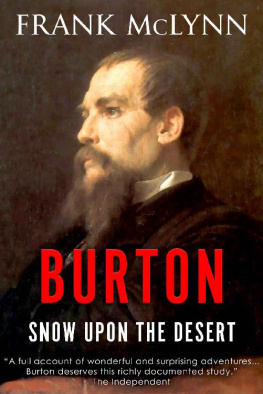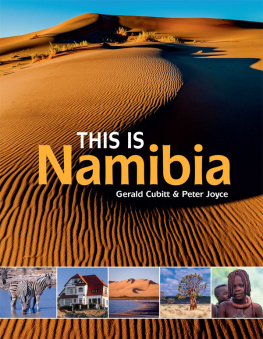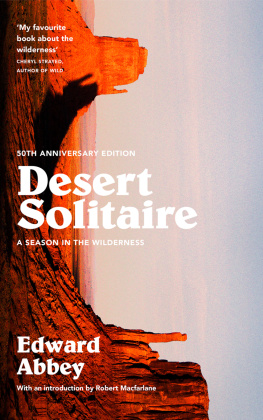Hilda Faunce - Desert Wife
Here you can read online Hilda Faunce - Desert Wife full text of the book (entire story) in english for free. Download pdf and epub, get meaning, cover and reviews about this ebook. year: 2014, publisher: UNP - Nebraska, genre: Non-fiction. Description of the work, (preface) as well as reviews are available. Best literature library LitArk.com created for fans of good reading and offers a wide selection of genres:
Romance novel
Science fiction
Adventure
Detective
Science
History
Home and family
Prose
Art
Politics
Computer
Non-fiction
Religion
Business
Children
Humor
Choose a favorite category and find really read worthwhile books. Enjoy immersion in the world of imagination, feel the emotions of the characters or learn something new for yourself, make an fascinating discovery.
- Book:Desert Wife
- Author:
- Publisher:UNP - Nebraska
- Genre:
- Year:2014
- Rating:3 / 5
- Favourites:Add to favourites
- Your mark:
- 60
- 1
- 2
- 3
- 4
- 5
Desert Wife: summary, description and annotation
We offer to read an annotation, description, summary or preface (depends on what the author of the book "Desert Wife" wrote himself). If you haven't found the necessary information about the book — write in the comments, we will try to find it.
This is the compelling narrative of the wife of an Indian trader in the desert wilderness of the Navajos before World War I. No other book about life at such trading posts equals its revealing portrayal of the land and the people, and its implication of the racial differences still confronting us today.From the introduction by Frank Waters
Desert Wife — read online for free the complete book (whole text) full work
Below is the text of the book, divided by pages. System saving the place of the last page read, allows you to conveniently read the book "Desert Wife" online for free, without having to search again every time where you left off. Put a bookmark, and you can go to the page where you finished reading at any time.
Font size:
Interval:
Bookmark:


I turned back to the desert. It was bigger than ever, and lonesomer .

Copyright 1928, 1934 by Little, Brown, and Company, renewed 1961 by Hilda Faunce Wetherill
Introduction copyright 1981 by the University of Nebraska Press
ALL RIGHTS RESERVED
First Bison Book printing: 1981
Library of Congress Cataloging in Publication Data
Wetherill, Hilda Faunce, 1890
Desert wife.
Reprint of the ed. published by Little, Brown, Boston.
1. Wetherill, Hilda Faunce, 1890 2. Frontier and pioneer lifeArizona. 3. Navaho Indians. 4. Pioneers ArizonaBiography. 5. ArizonaBiography. I. Title.
F811.W48 1981 979.105 8022163
ISBN 080326853X (pbk.)
ISBN-13: 978-0-8032-7463-1 (electronic: e-pub)
ISBN-13: 978-0-8032-7464-8 (electronic: mobi)
The publisher does not have any control over and does not assume any responsibility for author or third-party websites or their content.
ILLUSTRATIONS
Frontispiece
ACKNOWLEDGMENT
While living on the Navajo Reservation, I wrote a series of letters, a sort of running commentary of my experiences, to my cousin, Ruth Wattles. Those letters form the kernel of what has now grown into the book, Desert Wife.
Among Miss Wattles earliest memories are those of Navajos sitting about the big fireplace in the ranch home of her parents, waiting to be fed. She grew up with a lasting respect and friendliness for the Navajos, and in her high-school days was engaged in collecting their legends. Graduate work at the University of California, where Miss Wattles took her Masters degree, gave her an opportunity to read volumes of material on these Indians, and without her guidance and literary aid, Desert Wife never would have come into being. For this collaborative effort she should receive full credit.
H ILDA F AUNCE
INTRODUCTION
by
Frank Waters
This is the compelling narrative of the wife of an Indian trader in the desert wilderness of the Navajos before World War I. No other book about life at such trading posts equals its revealing portrayal of the land and the people, and its implication of the racial differences still confronting us today.
My opinion is grounded on a firm bias.
When I was a boy in Colorado Springs, my teacher in Columbia grade school was a perceptive young woman named Ruth Jocelyn Wattles. Ours was an unruly class. Instead of punishing us for misbehavior, she rewarded us if we were quiet by reading stories at the end of the day. Our favorites were stories of the Navajos; and most of these were excerpts read from letters written to her by her cousin, Hilda Faunce, from the remote trading post of Covered Water in Arizona. Miss Wattless own familiarity with navajos who had come to her home ranch in Mancos, Colorado, embroidered the stories. But it was the letters themselves that held us. What wonderful tales of a strange people in a far-off desert land!
They all came true a few years later when my two old-maid aunts took me to live for a time at the also isolated trading post of Shallow Water in New Mexico. Here were the same immensity of sand and sage, the same tribesmen riding in on horseback or in old springless wagons to trade and squat motionless for hours in front of the post.
Miss Wattles meanwhile had sent excerpts from her cousins letters to Harpers magazine. Published there, they aroused the enthusiasm of Little, Brown, and Company, who persuaded her and Hilda Faunce to arrange them in book form. The book was published and reprinted in 1934, and now is being wisely reissued in its present format by the University of Nebraska Press.
The terms of its appeal to us now are magnified by the perspective cast by the years and changes that have happened sincechanges that have outwardly transformed the land and The People, but have not altered the enduring realities that still imbue them.
Hilda Faunces narrative begins when she and her husband, Ken, are living in Oregon. The perpetual rain and fog are depressing. The bank fails. Hilda can endure these discomforts and reverses. Her husband cant. He was desert-bred, had once been an Indian trader in the Southwest. He is homesick, has to go back.
So they pack their belongings in a light spring wagon and drive back to Kens desert heartland. There are few fences, roads, and automobiles. Camping at infrequent waterholes, they finally reach the Four Corners country where four states touch: Arizona, New Mexico, Utah, and Colorado. Ken is home. He buys the abandoned trading post of Covered Water near Black Mountain. It is 20 miles from the post at Chinle, Arizona, their nearest neighbor; 105 miles from Gallup, New Mexico, the nearest town.
The trading post is a decrepit two-room shack of rough planking held together by box boards. The back door opens into a storage tent for goat hides, sheep pelts, sacks of wool, supplies. Nearby, the seepage from a spring fills a well covered with boards: Covered Water.
There is not a tree in sight. All around, interminably, spreads the vast empty plain. Into the post seeps sand, snow, loneliness. Without privacy, Hilda huddles in the back room peeking through the blanket hung over the doorway. She glimpses the Navajos spitting on the floor, picking lice from their hair, begging coffee. Their dark faces are strange, their customs queer, their language she doesnt understand. Ken feels perfectly at home. He speaks Navajo, builds up his trade, sending hides, pelts, and huge sacks of wool by six-horse teams to Gallup.
Gradually Hilda learns to speak Navajo, makes friends with Old Lady, Slender Girl, Hosteen Blue Goat. Helping Ken in the store, she learns to estimate the amount of sand cheating Indians put in their sacks of wool. They begin to prosper, saving money to buy someday a little farm of their own. Yet over all Hilda senses the old antipathy between the red and white races, the strange place-spirit so inimical to an alien newcomer.
She succumbs to a serious illness that affects her mentally and physically. She cant eat. Her hair falls out. She seemed to be turning into an Indian, becoming a deep, burnt orange color all over. If she died, the post would be a total loss. No Navajo would ever step inside it. They might burn it; that was their way. They have stolen the shovel; Ken would be unable to dig her grave outside. There is no escape, even in death. So Hilda worries in moments of lucid consciousness.
A doctor in Gallup is sent for. He stays twenty minutes and charges $225. It is not too much for the 105-mile drive. He leaves Hilda some pink pills and advises an operation in Gallup if she lives.
Hilda lives and undergoes a gall bladder operation. A month later Ken meets her and drives her back to Covered Water. This is the psychological turning point in her life. En-Tsos herb tonic restores her hair. And from now on she accepts without question the different ways and beliefs of the Navajos, even when they kill one of their members for having robbed a grave of jewelry. Why do we try to thrust our civilization on a people like this? she asks herself.
Without prejudice or sentimentality she recounts their hard and courageous life. A cyclone kills two little boys with their sheep. An epidemic of influenza leaves dead bodies in their hogans, which are then burned over them. Smallpox wipes out family after family. Hilda rides to others to immunize them with vaccine. When World War I breaks out, every Navajo man is ordered to register for the draft at Fort Defiance. Talk spreads that they will be put in front and shot first to save the white men. The Navajos, resolving never to leave their homes and their land, make plans to burn all trading posts and to kill every white man on the reservation. Ken averts the possible massacre. Incident after incident that must be read in her own words. And finally after four years, having saved a stake toward their small farm, Hilda and Ken leave Covered Water.
Next pageFont size:
Interval:
Bookmark:
Similar books «Desert Wife»
Look at similar books to Desert Wife. We have selected literature similar in name and meaning in the hope of providing readers with more options to find new, interesting, not yet read works.
Discussion, reviews of the book Desert Wife and just readers' own opinions. Leave your comments, write what you think about the work, its meaning or the main characters. Specify what exactly you liked and what you didn't like, and why you think so.

